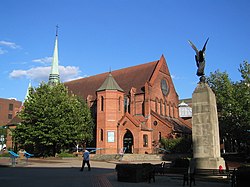Woking
| Woking | |
| Surrey | |
|---|---|
 Woking Town Square | |
| Location | |
| Grid reference: | TQ003584 |
| Location: | 51°18’58"N, -0°33’40"W |
| Data | |
| Population: | 62,796 |
| Post town: | Woking |
| Postcode: | GU21, GU22 |
| Dialling code: | 01483 |
| Local Government | |
| Council: | Woking |
| Parliamentary constituency: |
Woking |
Woking is a large town in western Surrey. It is part of the London commuter belt. One of the larger individual towns in Surrey, Woking has an ancient origin, but in its current form it is a relatively new town, with an unusual origin in a nineteenth century necropolis project.
Old Woking is the original town, now at Woking's southern fringe and gathered along the River Wey.
The Basingstoke Canal passes through the north of the town.
History
Woking appears in the Anglo-Saxon Chronicle entry for 777, recording that in that year on a petition of Brorda the ealdorman, King Offa of the Mercians freed the church amongst the Woking-folk (Wocingas) from obligations to king, earl and bishop so that Brorda could grant it to the minster of Medehamstede. In the Domesday Book of 1086 it is listed as Wochinges, being held by the King, Walter FitzOther, constable of Windsor Castle, and Ansgot and Godfrey from Osbern FitzOsbern, then bishop of Exeter.
Modern Woking was formed in the area to the south of the Basingstoke Canal (which opened in 1794) around the railway station, built over 150 years ago at the junction between lines to London, the south coast, and the south-west of England, and the private railway to Brookwood Cemetery, which was developed by the London Necropolis Company as an overflow burial ground for London's dead. As a result, the original settlement 1 mile to the south-east, on the River Wey, became known as "Old Woking". Later, Woking was home to the first crematorium in the United Kingdom (St Johns), and the first purpose-built mosque in the United Kingdom (on Oriental Road). The Shah Jahan Mosque was commissioned by Shahjehan, Begum of Bhopal (1868–1901), one of the four female Muslim rulers of Bhopal who reigned between 1819 and 1926. The mosque has given rise to the town's significant Asian community.
People
Woking is a multicultural town. There is an old and large tight-knit Italian community in Woking, the majority coming from the Sicilian town of Mussomeli[1]. There is also a large Pakistani population in Woking, most of them centred around the suburbs of Maybury and Sheerwater[2]. Woking has recently seen an influx of eastern European immigrants, mostly from Poland[3].
Popular fiction
The setting for the novel The War of the Worlds (1898), by H G Wells, is Horsell Common north of Woking. This is an early science fiction novel which describes an invasion of England by aliens from Mars. It is one of the earliest and best-known depictions of an alien invasion of Earth and has influenced many others, as well as spawning several films and radio dramas and a television series based on the story.
In Douglas Adams's The Meaning of Liff, "woking" appears as the word for when you go to the kitchen but forget why.[4]
Notes
- ↑ http://www.rhul.ac.uk/Whats-New/news2001/wokingitalians.html
- ↑ http://www.guardian.co.uk/uk/2006/jan/23/britishidentity.features112
- ↑ http://www.sefip.gov.uk/viewDocument.jsp?document=2230
- ↑ Douglas Adams, 'The Deeper Meaning of Liff', London: Pan Books/Faber & Faber, 1992, p. 109.